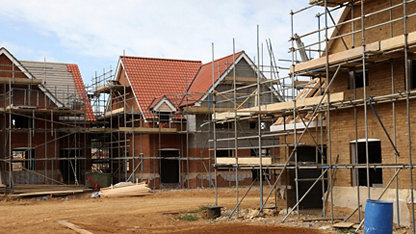On Thursday 9 December, Cabinet Secretary for Finance and the Economy Kate Forbes MSP delivered the Scottish Government’s Budget, with the ambition of transitioning Scotland to a “fairer, more prosperous, and greener country”, and plans to invest in infrastructure that “drives down emissions and creates the green jobs of the future”.
It consists of the Government’s spending and tax plans for the coming financial year, a Spending Review framework, a financial strategy, and an economic and fiscal forecast from the Scottish Fiscal Commission.
The Budget is being presented in the midst of a challenging economic environment, with businesses embracing an uncertain post-COVID future and grappling with the potential prospect of new restrictions over the coming months. While Scottish Government was in receipt of a sizeable block grant due to the significantly increased spending that has taken place across the UK over the past year, day-to-day funding has decreased, due to the removal of additional COVID-19 funding.
A full list of key announcements can be found at the bottom of this article, and further resources below:
- Full speech here and here.
- Budget document here.
- Scottish Fiscal Commission forecasts here.
- Medium Term Financial Strategy here.
- Spending Review Framework here.
Political Analysis
Given the formal cooperation agreement (don’t say coalition) between the SNP and Scottish Greens, this Budget will pass, and it is therefore a relatively low risk political event for the Government. However, setting a plan for the nation’s finances always entails potential opportunities and pitfalls.
The Scottish Government has sought to differentiate its own plans for Scotland’s recovery from that of Westminster, while highlighting what it sees as the missed opportunities from being ‘held back’ by the Union. It’s a fine balancing act but one that the First Minister and Finance Secretary are well practiced in treading.
The key criticism that unites opposition parties is that of delivery. And the real question to be asked over the coming months and years is whether the Scottish Government can achieve its ambitious targets on issues such as net zero.
While it wouldn’t be an SNP Government Budget without undertones of independence rhetoric, there was little by way of explicit calls to action. However, there was a clear intent to highlight Brexit as the main cause of Scotland’s economic concerns in the long-term, rather than COVID-19. The First Minister also confirmed earlier today that the plan is for campaigning to resume in 2022, with the goal of enabling a referendum before the end of 2023.
What happens next?
The Budget will now be debated in Parliament, with a vote on the Budget Bill taking place ahead of the new financial year in April. Though the timings have not yet been agreed, a debate on the various Parliamentary Committees’ pre-budget reports will take place in January, with the Budget Bill debates shortly thereafter. At Stage 1 – when MSPs usually vote on the general principles of the Bill – amendments will be tabled that propose alternative revenue and spending plans.
RICS Activity
RICS has engaged throughout the Budget process and will continue to scrutinise and influence proceedings as they develop.
At a high level, as part of the Scottish Government’s pre-Budget consultation, we reiterated our calls for the Government to encourage repair, maintenance and improvement (RMI) work within its own fiscal competence, and called for a full and thorough review of property taxation to help foster an equitable economic and social recovery post-COVID, and lay the groundwork for a shift to net zero.
Our ongoing contribution to various working groups, and our one-to-one meetings with officials and political stakeholders will allow us to be a key voice in shaping the future of core issues such as cladding and building safety, and the Heat in Buildings Strategy.
Further, we continue to promote RICS standards and those developed alongside our industry partners to drive positive change in the built and natural environment, and promote the role of the Chartered Surveyor profession. We were delighted to see a Scottish Parliament Motion tabled in support of ICMS3 – a world first for cost and carbon management in construction - last week, securing the cross-party support of SNP, Labour and Conservative MSPs. See here.
Key Announcements
The Economy & General Taxation
- GDP growth forecasts (see p5 of Scottish Fiscal Commission forecast summary here):
- 2021-22: 10.4%
- 2022-23: 2.2%
- 2023-24: 1.2%
- 2025-26: 1.4%
- 2026-27: 1.4%
- Return to pre-pandemic GDP brought forward to Q2 2022.
- Long-term economic damage from COVID-19 forecast to be -2%, similar to that forecast for the UK.
- A 4% long-term reduction in living standards was forecast due to the UK’s exit from the European Union.
- Unemployment rate of 4.9% expected by end of year, below 7.5% forecast at the previous Budget.
- Scottish Income Tax receipts expected to be £190m lower than the corresponding Block Grant Adjustment for 2022-23.
- Income tax rates to remain unchanged, with starter and basic rate bands rising with inflation and higher and top rates remaining frozen.
- “Supply chain bottlenecks, labour market shortages, inflationary pressures, and rising energy prices” highlighted as placing additional pressure on businesses and households.
Construction & Infrastructure
- £205m for the Scottish National Investment Bank.
- Publication of the National Strategy for Economic Transformation shortly.
- £150m in active travel infrastructure.
- £1.4bn to maintain, improve and decarbonise Scotland’s rail network.
- £1.5bn increase in infrastructure spend by 2025-26, and total investment of £34.1bn between 2021-22 and 2025-26, as set out in the National Infrastructure Mission.
- Targeted review of Infrastructure Investment Plan to take place in early 2022.
Housing & Residential
- House price forecast increased due to increased housing market activity, with average prices of £200,000 in 2022-23 and £222,000 in 2025-26.
- Land and Buildings Transaction Tax to remain at current levels for residential and non-residential properties.
- Call for Evidence on changing the Additional Dwelling Supplement to be launched shortly.
- £831m for affordable housing, to help deliver 110,000 affordable, energy efficient homes over the coming decade, and supporting the construction sector.
- Additional £9.5m for Fire and Rescue Scotland, helping its work on fire prevention and safety in vulnerable households.
High Streets & Commercial Property
- Rates relief for retail, hospitality and leisure to continue at 50% for the first three months of 2022-23, capped at £27,500 per ratepayer.
- Poundage of 49.8p, the “lowest Non-Domestic Rates poundage” in the UK.
- Small businesses with a rateable value of less than £15,000 will continue to pay no rates for the full coming year.
- New builds to pay no rates for the first 12 months after occupation through the Business Growth Accelerator.
- £96m in place-based investment programme to regenerate communities and town centres.
Land & Rural
- £51m in rural services and islands, including activities linked to the National Islands Plan and introducing a new Islands Bond Fund.
- £53m to restore Scotland’s natural environment.
- £25m investment to transform farming and food production.
- £69.5m investment in woodland creation and sustainable woodland management.
Net Zero
- £2bn of low carbon capital investment in public infrastructure.
- Confirmation of the first £20m in the ten-year £500m Just Transition Fund for the North East and Moray.
- £366 million for energy efficiency, and low carbon and renewable heat.
- £60 million for large scale heat decarbonisation projects and investment of £53 million across a range of large-scale, industrial decarbonisation projects.
- £43 million to drive forward Scotland's circular economy.
Skills, Education & Work
- £200m for the Scottish Attainment Challenge, with over £1 billion over the coming Parliament to tackle the “poverty-related attainment gap”.
- £225m investment in Skills Development Scotland.
- £2bn allocation to Scotland’s universities and colleges.
- £23.5m for the Green Jobs Fund.
- Guaranteed inflationary uplift for those on the pay policy, and wage floor of £10.50 per hour.
Other
- As trailed in advance, an increase to £18bn funding for Health and Social Care, and the doubling of the Scottish child payment to £20 a week.
Please contact eryan@rics.org if you have any questions, or would like to be involved in RICS’ public affairs and advocacy work in Scotland.













